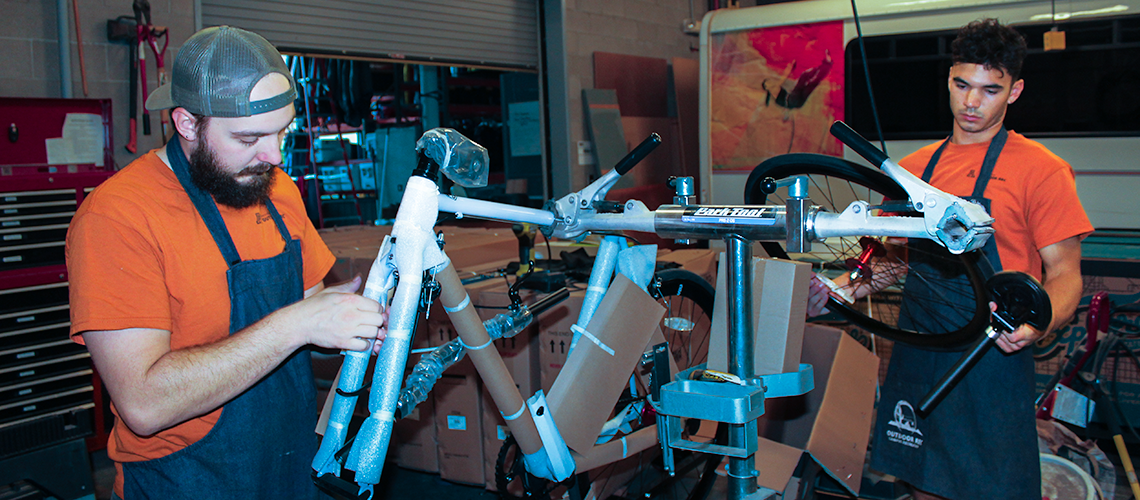
Faculty, staff and students interested in organizing environmental and social sustainability projects on campus are invited to apply for funding through the Campus Sustainability Annual Grants program.
The program, founded in 2021 and housed in the Office of Sustainability, funds large- and small-scale initiatives that advance sustainability efforts through collaboration between applicants and the student Campus Sustainability Fund Committee members, who are responsible for evaluating and selecting project proposals. The committee is seeking proposals that include student leadership or engagement and promote equity by providing support to underrepresented groups on campus.
Preliminary applications for Annual Grants, which range from $5,001-$100,000, are open now through Jan. 15, 2023. Depending on the project's goals and timeline, up to $100,000 is available per year for up to three years for a single project. After a period of review and feedback, final applications will be due in early March. Applicants must attend a virtual office hour prior to submitting their preliminary application, according to Emily Haworth, the program's coordinator.
This is the first time the Annual Grant application process has started in the fall, creating a longer timeline for the committee to review proposals and provide comprehensive feedback.
The full timeline:
- Required virtual office hour: Nov. 14-18, Jan. 2-13
- Preliminary application deadline: Jan. 15
- Review and feedback period: Jan. 23-Feb. 13
- Final Application deadline: March 5
- Interviews: April 3-21
- Funding decisions: May
"Starting the Annual Grant process now in the fall semester gives us the time to have a more intentional process," Haworth said. "The more intentional of a process, the better quality of grants we can fund and allow projects to better succeed if we give them that time."
Looking for some inspiration? Learn more about four of the eight proposals awarded Annual Grant funding last year.
Campus Pantry Bulk Foods Program
The University of Arizona Campus Pantry received $10,000 per year for three years to introduce reusable containers for the storage of dry goods. Campus community members, including faculty and staff, who use the Campus Pantry can receive these containers free of charge and bring them back to the distribution site to be refilled, reducing the number of single-use plastic packaging.
"This semester alone, we have seen nearly 1,400 users per week, and give out, on average, 2,200 pounds of food per day," said Yesenia Torres, a student co-director for the Campus Pantry and an undergraduate studying family studies and human development. "In order to provide a sustainable future for the pantry, we looked toward alternatives that minimize costs and waste to ensure we can provide an effective amount of supplemental groceries to our users."
Bio/Diversity Project
Through an $86,600 grant award, the Bio/Diversity Project offers paid student internships. Housed within the Women in Science and Engineering program, the Bio/Diversity Project facilitates semester-long internships for University students to provide K-12 students from Title I schools with hands-on, culturally responsive and place-based environmental science activities. "CSF funding allows the Bio/Diversity Project to increase access to program participation and impact a greater number of University of Arizona students, particularly those from historically marginalized populations," said Elena Greenberg, senior program coordinator at WISE.
Campus Bike Shop Initiative
Campus Recreation is launching the Bike Shop initiative with the support of a $22,700 grant. Starting in the spring, students can rent a bike – and receive basic maintenance and tune-ups – for a reduced fee. Users can take the bikes home, to school or anywhere else they might need to travel over the course of the semester-long rental period. Renters can also take advantage of information sessions on bike repair, maintenance and safety, said Andrew Huff, project manager and assistant director of outdoor adventures for Campus Recreation. These subsidized long-term bike rentals will create more opportunities for students to reduce their carbon footprint and have reliable and affordable transportation, he said.
Feeding the Future
With the support of a one-year $85,700 grant, Biosphere 2 established a method of growing and harvesting produce without sunlight, herbicides or pesticides. The portable and contained system, called Freight Farms Greenery S, has the potential to address food insecurity and injustice by enabling food to be grown close to the communities that will consume the food. It will also reduce carbon emissions resulting from the production and transportation of crops. The project is led by John Adams, deputy director of Biosphere 2, and has already begun to deliver lettuce crops grown and harvested through the modular farm container technology to the Campus Pantry and the Impact of Southern Arizona social service nonproft, which operates a food bank.
The Campus Sustainability Fund also offers mini grants of $250-$5,000 for time-sensitive and small-scale projects that aim to fulfill the same environmental and social sustainability goals of the annual grants. The applications for mini grants for this academic year have already closed. Applications will reopen Jan. 2.
Questions about the Campus Sustainability Fund or the annual grant application process can be directed to Haworth at emilyhaworth@arizona.edu.
Article by Catherina Broski, a student employee in University Communications, 2022
